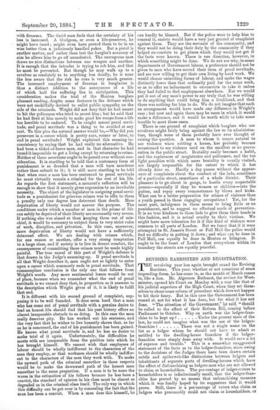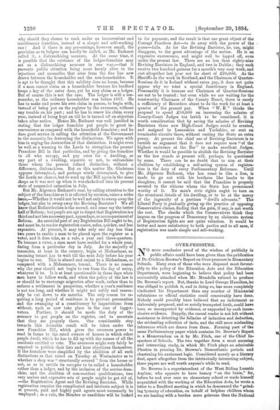REVISING BARRISTERS AND REGISTRATION. T HE revolving year has again brought
round the Revising Barrister. This year, whether or not conscious of some impending doom, he has come in, as the month of March comes in, like a lion. Mr. Algernon Bathurst, the reviser for West- minster, opened his Court on Monday with a roar like that of his judicial superiors of the High Court, when they set them- selves to abuse some reform of procedure which does not happen to hit their fancy. But in this case the Government has been roared at, not for what it has done, but for what it has not done. "The attention of the Government," he said, "should be called to the effect of their Reform Bill, coming before Parliament in October. Why on earth was the lodger-fran- chise to be kept up 2 .. Under the present state of the law, he could not imagine what was the use of the lodger- franchise 2 There was not a single name on the list as a lodger whom he should not have to admit as entitled to the dwelling-house franchise if the lodger- franchise were simply done away with. It would save a lot of expense and trouble." This is a somewhat exaggerated statement of the facts as to the lodger-franchise, since owing to the decisions of the Judges there have been drawn certain subtle and spiderweb-like distinctions between lodgers and inhabitants of separate parts of dwelling-houses which have the effect of disfranchising as lodgers men who are not allowed to claim as householders. The per-centage of lodger-voters to householders is so infinitesimally small, that the lodger-fran- chise has proved by no means that enfranchising measure which it was fondly hoped by its supporters that it would prove. Still, there is a per-centage of voters who claim as lodgers who presumably could not claim as householders, or why should they choose to rank under an inconvenient and troublesome franchise, instead of a simple and self-working one ? And if there is any per-centage, however small, the provision as to lodgers can hardly be called, as Mr. Bathurst called it, a disfranchising measure. At the same time, it is possible that the existence of the lodger-franchise may act as a disfranchising measure in one way,—that it prevents public attention being more keenly alive to the Injustices and anomalies that arise from the fine line now drawn between the householder and the non-householder. It is apt to be thought that this subtlety does no harm, because if a man cannot claim as a householder because his landlord keeps a key of the outer door, yet he may claim as a lodger. But of course this is not the case. The lodger is still a ten- pounder, as the ordinary householder was before 1867. He has to make and prove his own claim in person, to begin with, Instead of being put on the register by the overseers, without any trouble on his part ; and he has to renew his claim every year, instead of being kept on till he is turned off on objection taken after notice. Hence Mr. Bathurst was well justified in stating that the lodger franchise put people to great in- convenience as compared with the household franchise ; and he does good service in calling the attention of the Government to the necessity for destroying the distinctions. We agree with him in urging the destruction of that distinction. It might even be well as a warning to the Lords to strengthen the present Franchise Bill in that particular, and by giving the franchise to all who occupy, and pay rates for a dwelling, or any part of a dwelling, separate or not, to enfranchise those whom the present refined distinction, without a difference, disfranchises. But on this matter Mr. Gladstone appears determined, and perhaps wisely determined, to give the Lords no chance, but to send up the Bill again in the same shape as it was sent up when it was choked-off into its present state of suspended animation in July.
But Mr. Algernon Bathurst's roar, by calling attention to the subject of the franchise as it is affected by revision, raises a wider isaue,—Whether it would not be well not only to sweep away the lodger, but also to sweep away the Revising Barrister ? We all know that Redistribution is the second, and some say the better half of Reform; but people are apt to forget that Registration is a third and not less necessary part, appendage, or accompaniment of Reform. An essential part of any Registration Bill ought to be, and must be, to render registration easier, safer, quicker, and less expensive. At present, it may take only one day less than two years to enable a man to be placed upon the register as a voter, and it does take, as a rule, a year and three-quarters. To become a voter, a man must have resided for a whole year, dating from a particular day in July. As the majority of tenancies, at least in the country, begin at Michaelmas, an incoming tenant has to wait till the next July before his year begins to run. This is absurd and unjust to a Michaelmas, as compared with a Midsummer,. tenant. There is no reason why the year should not begin to run from the day of entry, whatever it be. It is at least questionable in these days when men have to follow work, and when the policy of the law is or should be to encourage migration after work, rather than to enforce a settlement in pauperism, whether a year's residence is not too long, and whether it might not safely and reason- ably be cut down to six months. The only reason for re- quiring a long period of residence is to prevent personation and the swamping of a constituency by importations from without, such as now take place in the case of faggot- voters. Further, it should be made the duty of the overseer to .put people on the register, and to ascertain that they are properly there. One considerable step towards this desirable result will be taken under the new Franchise Bill, which gives the overseers power to send in forms to the rated owners of houses in which other people dwell, which he has to fill up with the names of all the residents entitled to vote. The overseers might very fairly be required to publish their lists and hear objections themselves. If the franchise were simplified by the abolition of all such distinctions as that raised on Tuesday at Westminster as to whether a shop was "structurally severed" from the house or not, so as to entitle its occupier to be called a householder rather than a lodger, and by the inclusion of the service-fran- chise, and the abolition of non-resident qualifications, two very useless and expensive sets of people might be got rid of, —the Registration Agent and the Revising Barrister. While registration remains the complicated and intricate subject it is at present, paid and highly paid agents must necessarily be employed ; as a rule, the Member or candidate will be looked to for payment, and the result is that one great object of the Corrupt Practices Act—to do away with the power of the • purse—fails. As for the Revising Barrister, he, too, might disappear, to the great advantage of the nation. He is an expensive excrescence, and might well be lopped off, even under the present law. There are no less than eighty-nine Revising Barristers in England, and two in Dublin ; they each receive two hundred guineas for a month's very easy work, and cost altogether last year not far short of £20,000. As the Sheriffs do the work in Scotland, and the Chairmen of Quarter- Sessions do it in Ireland without extra pay, it does not quite appear why we want a special functionary in England. Presumably it is because our Chairmen of Quarter-Sessions are not to be trusted ; but even while we are waiting for the trustworthy Chairmen of the County .Board, there is surely a sufficiency of Recorders about to do the work for at least a quarter of the present pay. When "W. B." thinks the proposal to spend £58,000 on increasing the salaries of County-Court Judges too lavish to be considered, it is worth consideration that by saving the salaries of Revising Barristers three new High-Court Judges could be created, and assigned to Lancashire and Yorkshire, or sent on terminable circuits there, without costing the State an extra penny. At present the chief use of Revising Barristers is to furnish an argument that it does not require men "of the highest eminence at the Bar" to make excellent Judges. Whether it would be possible to abolish the Revising Barrister as the law stands at present will, perhaps, be questioned by some. There can be no doubt that to aim at their abolition by establishing a self-acting system of registra- tion is the duty of every Parliamentary Reformer. Until Mr. Algernon Bathurst, who has come in like a lion, is made to go out with his brethren like lambs to the slaughter, it cannot be said that the Franchise is properly secured to the citizens whom the State has pronounced worthy of it. No man's civic rights ought to turn on the structural details of his dwelling, or to be at the mercy of the ingenuity of a partisan "devil's advocate." The Liberal Party is gradually giving up the practice of opposing Conservative claims, finding that the gain, if any, is not worth the cost. The checks which the Conservatives think they impose on the progress of Democracy by an elaborate system of Registration fights are not quite valueless. It would be better and more satisfactory to both parties and to all men, if registration was made simple and self-working.



































 Previous page
Previous page